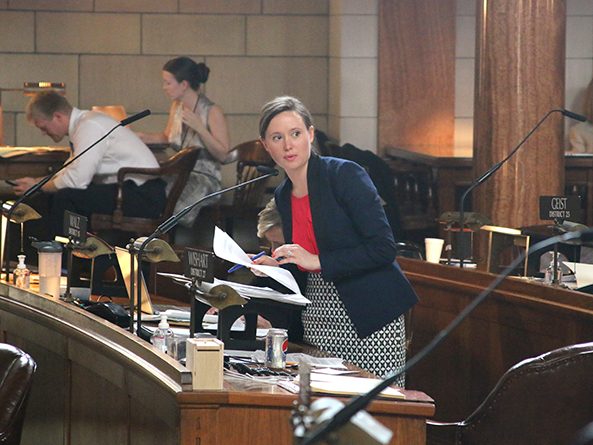Legalization of medical cannabis stalls
A bill that would approve certain forms of cannabis for medical use stalled on general file April 19. Cannabis is a plant that produces tetrahydrocannabinol (THC), a chemical compound known to have a variety of psychological and physiological effects on the human body.

LB622, as introduced by Lincoln Sen. Anna Wishart, would authorize the state Department of Health and Human Services to register only one cannabis manufacturer in each of the state’s three congressional districts. Each manufacturer would be required to contract with an independent laboratory — subject to approval by DHHS — to test the safety and efficacy of its product.
Additionally, DHHS could register up to four cannabis dispensaries in each congressional district. All medical cannabis would be dispensed by a licensed pharmacist.
Any county, city or village governing body would be authorized to adopt a resolution or ordinance prohibiting the operation of a manufacturer or dispensary or both within its boundaries.
Wishart said commonly prescribed drugs such as opioids have become one of the leading causes of accidental deaths in the United States. However, in states that have legalized medical cannabis, she said, opioid overdose deaths have decreased by 25 percent.
“It would be unreasonable, arbitrary and capricious for the [federal Drug Enforcement Agency] to stand between people suffering and medical cannabis,” Wishart said.
A pending Judiciary Committee amendment would permit cannabis only in liquid, oil, pill or vaporized form. A seven-person, governor-appointed Medical Cannabis Board would advise the department regarding medical cannabis regulations.
Patients with qualifying conditions could apply to DHHS for enrollment on a proposed patient registry. Qualifying medical conditions would include amyotrophic lateral sclerosis (ALS) or severe and persistent muscle spasms, including those associated with multiple sclerosis (MS); epilepsy and seizures; pain, nausea and wasting associated with cancer; glaucoma; HIV or AIDS; Crohn’s disease; Tourette’s syndrome; post-traumatic stress disorder; anxiety; and any other illnesses for which cannabis provides relief as determined by a health care practitioner.
Also eligible would be terminally ill patients with a probable life expectancy of under one year if the illness or its treatment produces severe or chronic pain, nausea, severe wasting, hepatitis C, lupus, Huntington’s disease, Parkinson’s disease, Lyme disease, spinal cord injury or opioid addiction.
A designated caregiver administering the drug to a patient would be at least 21, agree to possession of cannabis only for purposes of assisting the patient, not be a caregiver for more than one patient unless they reside in the same home and would pass a criminal background check. Parents and legal guardians would not be required to register with the department but would be subject to a background check.
Lincoln Sen. Mike Hilgers opposed the bill, saying there is no significant scientific evidence to back up the anecdotal evidence given by its supporters. It would be premature for the Legislature to act, he said, before the Federal Drug Administration (FDA) has adequately studied the issue.
“We currently have a process to determine what types of drugs should be available for public consumption and that process is through the FDA,” he said. “This Legislature is not equipped to make this type of clinical determination.”
Sen. Adam Morfeld of Lincoln supported the bill, saying that the lack of evidence is a result of political pressure. Withholding a medical treatment from a patient who could receive relief from medical cannabis is impossible to justify, he said.
“There is no reason why a Nebraskan mother or father should risk going to prison to help their children based on the advice of their doctor,” Morfeld said. “That is exactly what is happening right now.”
In opposition to the bill, Gothenburg Sen. Matt Williams said empathy for suffering people cannot outweigh what is best for all Nebraskans. Legalizing a Schedule I drug like cannabis is a slippery slope that could lead to unintended consequences, he said.
“One of the concerns I have is the fact that every state that has legalized medical marijuana has now either legalized or has pending legislation to legalize recreational marijuana,” Williams said.
But Omaha Sen. Joni Craighead said legalizing cannabis for medical use would not lead to a drastic increase in recreational use. Medical cannabis has very low levels of the hallucinogenic compound THC, she said, which causes the high that marijuana is known for.
“Medical cannabis will not cause people to become weed smokers,” Craighead said, “But there is a number of cancer patients and people suffering from seizures who could benefit from it.”
Manufacturers and dispensaries would pay a $25,000 application fee to be remitted to a Medical Cannabis Regulation Fund to offset the cost to implement the bill. The fund also would collect annual operating fees of no more than $75,000 from manufacturers and $25,000 from dispensaries, to be collected by DHHS.
Under a proposed amendment presented by Wishart, manufacturers would be replaced by up to 10 cannabis producers and 10 processors in each congressional district. Additionally, the amendment would authorize up to eight dispensaries, in each congressional district. A $40,000 annual fee would be imposed on each producer and processor.
Senators moved on to other bills on the agenda without taking action on the bill.


